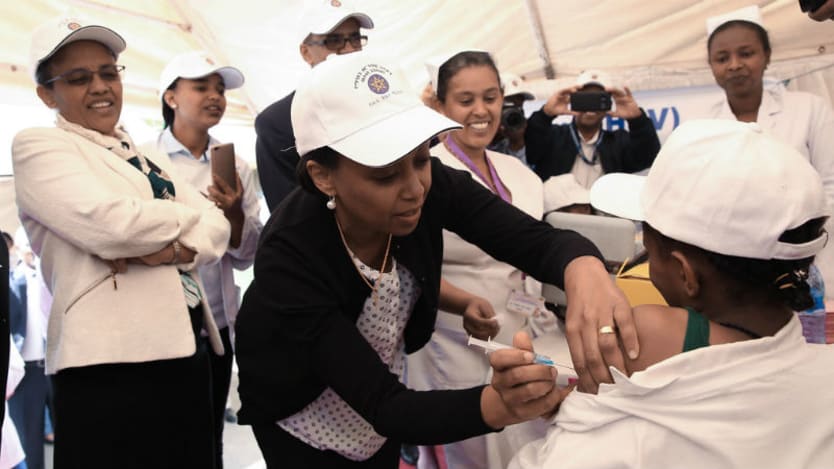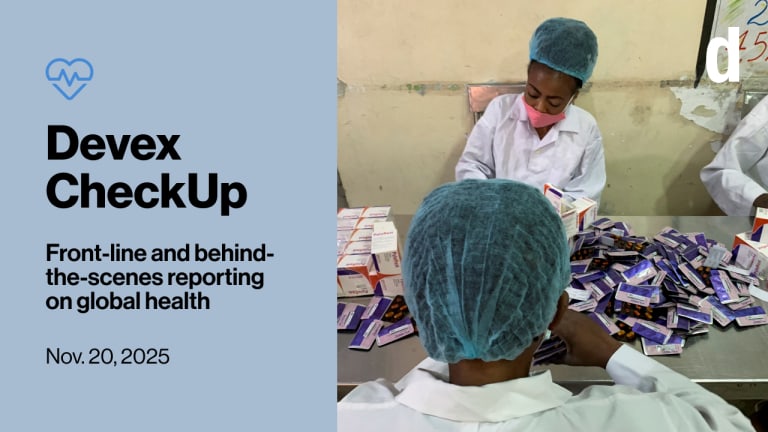
NAIROBI — African nations have been slow to roll out the Human papilloma virus (HPV) vaccination to their populations, despite the continent having a high incidence of cervical cancer, which the vaccine helps to prevent.
Currently, 10 African governments offer the HPV vaccine in their national immunization packages, according to the World Health Organization and Gavi, the vaccine alliance, namely Botswana, Ethiopia, Rwanda, Seychelles, Uganda, Tanzania, Senegal, Malawi, Zambia, and Zimbabwe.
Kenya is slated to be next, with plans to roll it out this month. East Africa carries the highest burden of cervical cancer in the world, in part because of the high incidence of HIV in the region, which causes immune system suppression, according to Jacqui Drope, managing director of Global Cancer Prevention at the American Cancer Society. While HPV is common among sexually active women and men, those with HIV have a harder time fighting off the infection, she said.
In 2018, there were 5,250 cases of cervical cancer and 3,286 deaths in Kenya, according to the Ministry of Health. This equates to nine deaths per day, with the number of cases on the rise.
“Especially in places like Kenya, nobody wants to talk about sexuality more broadly. That's a real challenge in terms of communicating how easily HPV is spread.”
— Katy Brignole, program manager, American Cancer Society“It's a bit embarrassing that, globally, at least 115 countries have the HPV vaccine within their routine immunization schedules, and Kenya is not among them. We are coming in on the lower half. It's a bit embarrassing," said Dr. Collins Tabu, head of Kenya’s National Vaccines and Immunization Programme, during a press conference in Nairobi on Wednesday.
Even now, with the help of funding from Gavi, for a national rollout, there are limits.
A global shortage in supply of the vaccine means that only 10-year-old girls will receive it for free — in two doses, six months apart. The vaccine is most effective when given to girls before they are sexually active and could be exposed to the virus. The government expects to provide it to 800,000 girls per year, shouldering 15% of the cost to begin with.
And although Gavi has negotiated with the vaccine’s makers for a price as low as $4.50 per dose for countries including Kenya — compared with over $100 per dose in high-income countries — sustainability is a concern.
“The government’s ability to continue purchasing the vaccine, even at Gavi-subsidized prices, and to fund related implementation costs is unclear,” according to the American Cancer Society.
Vaccine hesitancy and communication barriers
In neighboring countries, national governments have had to overcome misinformation about the vaccine, such as rumors about it causing infertility.
In Uganda, buy-in from local government leaders helped to overcome such fears. The Kenyan Ministry of Health is similarly looking to onboard its political leaders to champion the vaccine, said Dr. Mary Nyangasi, head of the National Cancer Control Programme in Kenya. Despite ongoing issues around vaccine hesitancy in Kenya and elsewhere, the Ministry of Health said it does not anticipate widespread resistance, noting that its pilot program of the vaccine in Kitui, eastern Kenya, enjoyed high levels of participation.
Devex explores vaccine hesitancy
WHO has identified vaccine hesitancy as one of the greatest threats to global health. Devex is exploring what it means for global health efforts around the world.
Other lessons from the experiences of neighboring countries include the need to master communication, Drope said.
For example, one of the issues in Uganda was a lack of understanding about the need to receive a second dose. As a result, there was a drop-off in girls coming back to complete the process, she said.
There have also been communication issues around how to frame the vaccine to the population, said Katy Brignole, a program manager at the American Cancer Society.
In the United States, the messaging originally focused on HPV, the sexually transmitted infection, rather than the prevention of cancer. But that messaging wasn’t successful, she said, in part because it was difficult for health providers to explain why young girls are targeted for this, and that HPV can be spread by sexual interactions other than penetration. In response, the messaging changed to focus primarily on cancer.
“That's why we've taken the approach that … we are vaccinating against the disease, which is cancer. We are not vaccinating against the STI,” she said.








